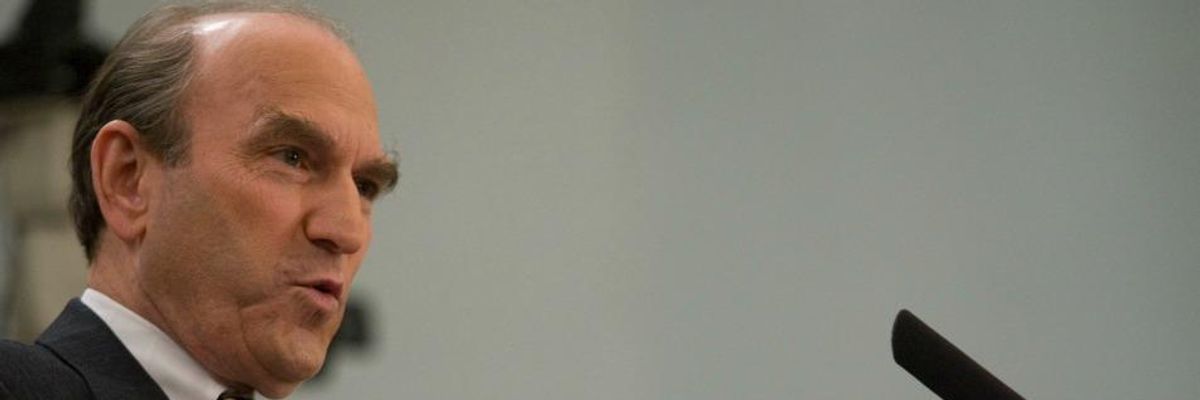When U.S. policymakers needed to spring a convicted CIA-connected drug trafficker from doing hard time in federal prison, who did they call?
Trump's infamous appointed special envoy to Venezuela, Elliott Abrams, according to a September 1986 National Security Council email, written by NSC staffer Oliver North.
In a U.S. House Committee hearing on Thursday, Rep. Ilhan Omar (D-MN) scorched Abrams for his covering up of the infamous El Mozote massacre and lying to Congress during the Iran-Contra conspiracy in the 1980s.
Her interrogation drew rebuke from Max Boot, the apostate conservative, and a chorus of right-wing media commentators. Boot described Omar's comments as a "disgraceful ad hominem attack."
Actually, the impertinent congresswoman from Minneapolis could have gone much further about Abrams' untrustworthy behavior. One of the most revealing stories comes from an impeccably right-wing source, Oliver North, former Republican senatorial candidate and Fox News talking head.
Bagman
The year was 1986. Abrams served as assistant secretary of state for Latin America under President Reagan. He was a 39-year-old lawyer and foreign policy polemicist who qualified as neoconservative royalty. (His wife was the daughter of Norman Podhoretz, the perfervid editor of Commentary magazine.) Even then his perennial scowl managed to make him look furtive and self-righteous at the same time.
The Iran-Contra conspiracy was in full swing. The conspiracy, permissively labeled "a scandal," was a Reagan White House plot to subvert the U.S. Congress' powers of the purse. North was the coordinator of what can fairly be described as an unconstitutional covert operation, while Abrams played the role of bagman.
To bypass the so-called Boland Amendment, Abrams took payments from the Sultan of Brunei, a petroleum potentate from South Asia, and passed them to the leaders of Reagan's counter-revolutionary army in Nicaragua. When questioned under oath, Abrams lied. He later pleaded guilty to two counts of deceiving Congress.
As part of the conspiracy, Abrams also put in a good word for a convicted drug trafficker, General Jose Bueso Rosa. He was a Honduran general who had helped the U.S. government with "sensitive operations" in Central America. As Murray Waas and I wrote in the Washington Post, North did "a favor for a felon."
So did Abrams.
'Sensitive Operations'
As an episode of CIA-sanctioned drug trafficking, the Bueso story was typical. Bueso, it turns out, had helped put together a CIA-trained military intelligence unit known as Battalion 316, which served as death squad for U.S. policymakers. A Honduran government investigation found that Battalion 316 had captured, tortured and executed some 200 suspected leftists.
Bueso had also trafficked multi-kiloton shipments of cocaine. As CIA Inspector General Frederick Hitz documented in Volume 2 of his report on contra drug trafficking, the agency did business with more than 50 suspected drug traffickers in the 1980s. (Lazy reporters sometimes say that the CIA was cleared of the allegation. They didn't bother to read the Sections 800-1148 of Hitz's report, which detailed how the agency took no action against four dozen suspected traffickers who aided Reagan's--and Abrams'--anticommunist crusade.)
Investigating the story for the Post, I spoke on background with law enforcement officials familiar with Bueso's case. A wiretap had picked up Bueso repeatedly talking about shipments of "flour" into central Florida, they said. Given Bueso's connections, no one in the Reagan Justice Department cared to make a big deal of his cocaine shipments, no matter how hefty. They just wanted a conviction that would put him out of business. Bueso got a generous plea bargain. He would only have to serve five years.
Bueso, however, was led to believe his American friends would save him from serving any time all.
In his September 1986 email, later uncovered by Iran-Contra investigators, North worried Bueso might "break his longstanding silence." He might disclose unpleasant truths about death squads and CIA drug trafficking.
So North "cabal[led] quietly" with Abrams, as well as top Pentagon, CIA and Justice Department officials. A presidential pardon was out of the question, but transfer to a comfortable "Club Fed" facility was arranged.
As time when U.S. prosecutors meted out 10-year sentences to young black men for the possession of a few ounces of cocaine, Abrams was part of a gang that thought a multi-kiloton trafficker should be treated leniently. Such was his advocacy of "human rights."
Bueso got out of prison early--for "good behavior." Abrams went on to a long career in U.S. foreign policy. Hundreds of thousands of black men remained in jails for years, if not decades.
Question
Rep. Omar could have asked an even tougher question of Abrams, namely, "Does Trump's policy toward Latin America today involve protection of drug traffickers as Reagan's policy did in the 1980s?"
She was certainly justified in questioning his veracity.
"I fail to understand why members of this committee or the American people should find any testimony you give today to be truthful," she said.
You can watch the Omar-Abrams exchange here.

